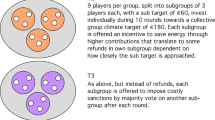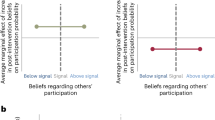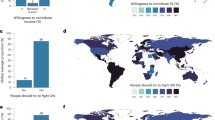Abstract
Despite more than two decades of diplomatic effort, concentrations of greenhouse gases continue to trend upwards, creating the risk that we may someday cross a threshold for ‘dangerous’ climate change1,2,3. Although climate thresholds are very uncertain, new research is trying to devise ‘early warning signals’ of an approaching tipping point4,5,6,7,8,9,10,11. This research offers a tantalizing promise: whereas collective action fails when threshold uncertainty is large, reductions in this uncertainty may bring about the behavioural change needed to avert a climate ‘catastrophe’5. Here we present the results of an experiment, rooted in a game-theoretic model, showing that behaviour differs markedly either side of a dividing line for threshold uncertainty. On one side of the dividing line, where threshold uncertainty is relatively large, free riding proves irresistible and trust illusive, making it virtually inevitable that the tipping point will be crossed. On the other side, where threshold uncertainty is small, the incentive to coordinate is strong and trust more robust, often leading the players to avoid crossing the tipping point. Our results show that uncertainty must be reduced to this ‘good’ side of the dividing line to stimulate the behavioural shift needed to avoid ‘dangerous’ climate change.
This is a preview of subscription content, access via your institution
Access options
Subscribe to this journal
Receive 12 print issues and online access
$209.00 per year
only $17.42 per issue
Buy this article
- Purchase on Springer Link
- Instant access to full article PDF
Prices may be subject to local taxes which are calculated during checkout



Similar content being viewed by others
References
Alley, R. B. et al. Abrupt climate change. Science 299, 2005–2010 (2003).
Lenton, T. M. et al. Tipping elements in the earth’s climate system. Proc. Natl Acad. Sci. USA 105, 1786–1793 (2008).
Kriegler, E., Hall, J. W., Held, H., Dawson, R. & Schellnhuber, H. J. Imprecise probability assessment of tipping points in the climate system. Proc. Natl Acad. Sci. USA 106, 5041–5046 (2009).
Dakos, V. et al. Slowing down as an early warning signal for abrupt climate change. Proc. Natl Acad. Sci. USA 105, 14308–14312 (2008).
Biggs, R., Carpenter, S. R. & Brock, W. A. Turning back from the brink: Detecting an impending regime shift in time to avert it. Proc. Natl Acad. Sci. USA 106, 826–831 (2009).
Scheffer, M. Critical Transitions in Nature and Society (Princeton Univ. Press, 2009).
Scheffer, M. et al. Early-warning signals for critical transitions. Nature 461, 53–59 (2009).
Ditlevsen, P. D. & Johnsen, S. J. Tipping points: Early warning and wishful thinking. Geophys. Res. Lett. 37, L19703 (2010).
Lenton, T. M. Early warning of climate tipping points. Nature Clim. Change 1, 201–209 (2011).
Scheffer, M. et al. Anticipating critical transitions. Science 338, 344–348 (2012).
Lenton, T. M., Livina, V. N., Dakos, V., van Nes, E. H. & Scheffer, M. Early warning of climate tipping points from critical slowing down: Comparing methods to improve robustness. Phil. Trans. R. Soc. A. 370, 1185–1204 (2012).
Carpenter, S. R. et al. Early warnings of regime shifts: A whole-ecosystem experiment. Science 332, 1079–1082 (2011).
Wang, R. et al. Flickering gives early warning signals of a critical transition to a eutrophic lake state. Nature 492, 419–422 (2012).
Scheffer, M., Carpenter, S., Foley, J. A., Folke, C. & Walker, B. Catastrophic shifts in ecosystems. Nature 413, 591–596 (2001).
Dai, L., Vorselen, D., Korolev, K. S. & Gore, J. Generic indicators for loss of resilience before a tipping point leading to population collapse. Science 336, 1175–1177 (2012).
May, R. M., Levin, S. A. & Sugihara, G. Complex systems: Ecology for bankers. Nature 451, 893–895 (2008).
Lackner, K. S. et al. The urgency of the development of CO2 capture from ambient air. Proc. Natl Acad. Sci. USA 109, 13156–13162 (2012).
Allen, M. R. et al. Warming caused by cumulative carbon emissions towards the trillionth tonne. Nature 458, 1163–1166 (2009).
Zickfeld, K., Eby, M., Matthews, H. D. & Weaver, A. J. Setting cumulative emissions targets to reduce the risk of dangerous climate change. Proc. Natl Acad. Sci. USA 106, 16129–16134 (2009).
Barrett, S. Climate treaties and approaching catastrophes. J. Environ. Econ. Manage. 66, 235–250 (2013).
Barrett, S. & Dannenberg, A. Climate negotiations under scientific uncertainty. Proc. Natl Acad. Sci. USA 109, 17372–17376 (2012).
Ledyard, J. O. in Handbook of Experimental Economics (eds Kagel, J. H. & Roth, A. E.) 111–194 (Princeton Univ. Press, 1995).
Rockström, J. et al. A safe operating safe for humanity. Nature 461, 472–475 (2009).
Lenton, T.M. & Ciscar, J-C. Integrating tipping points into climate impact assessments. Climatic Change 117, 585–597.
Robinson, A., Calov, R. & Ganopolski, A. Multistability and critical thresholds of the Greenland ice sheet. Nature Clim. Change 2, 429–432 (2012).
Hawkins, E. et al. Bistability of the Atlantic overturning circulation in a global climate model and links to ocean freshwater transport. Geophys. Res. Lett. 38, L10605 (2011).
Drijfhout, S.S., Weber, S.L. & van der Swaluw, E. The stability of the MOC as diagnosed from model projections for pre-industrial, present and future climates. Clim. Dynam. 37, 1575–1586 (2010).
Hastings, A. & Wysham, D. B. Regime shifts in ecological systems can occur with no warning. Ecol. Lett. 13, 464–472 (2010).
Ostrom, E. Governing the Commons: The Evolution of Institutions for Collective Action (Cambridge Univ. Press, 1990).
Barrett, S. Environment and Statecraft: The Strategy of Environmental Treaty-Making (Oxford Univ. Press, 2003).
Acknowledgements
We thank J. Rising for programming our ‘spinning wheel’, the MaXLab team at Magdeburg University for use of their laboratory and the Princeton Institute for International and Regional Studies research community on Communicating Uncertainty: Science, Institutions, and Ethics in the Politics of Global Climate Change for financially supporting our experiments.
Author information
Authors and Affiliations
Contributions
S.B. and A.D. contributed equally to this work. They both designed and performed the research and analysed the data and wrote the paper.
Corresponding author
Ethics declarations
Competing interests
The authors declare no competing financial interests.
Supplementary information
Rights and permissions
About this article
Cite this article
Barrett, S., Dannenberg, A. Sensitivity of collective action to uncertainty about climate tipping points. Nature Clim Change 4, 36–39 (2014). https://doi.org/10.1038/nclimate2059
Received:
Accepted:
Published:
Issue Date:
DOI: https://doi.org/10.1038/nclimate2059
This article is cited by
-
Voting Sustains Intergenerational Cooperation, Even When the Tipping Point Threshold is Ambiguous
Environmental and Resource Economics (2024)
-
The effect of environmental information on evolution of cooperation in stochastic games
Nature Communications (2023)
-
Is a Rational Politics of Disaster Possible? Making Useful Decisions for Others in an Experimental Disaster Game
Political Behavior (2023)
-
Sanctioned Quotas Versus Information Provisioning for Community Wildlife Conservation in Zimbabwe: A Framed Field Experiment Approach
Environmental and Resource Economics (2023)
-
Group identities can undermine social tipping after intervention
Nature Human Behaviour (2022)



